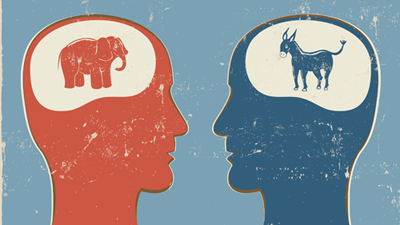Wednesday, 14 November 2018
Political Allegiance and Brain Biology
 How hard it is to get someone to shift their allegiance from one political party to another is something that many of us know from personal experience, but it has also been demonstrated experimentally. For example, in subjects who were exposed to political ideas opposed to their own, researchers have recorded brain activity similar to that associated with the processing of pain or negative emotions. Conversely, when subjects were asked to justify their own political positions, their ventral striatum became more active, the typical sign of a pleasant, positive experience—in short, a reward.
How hard it is to get someone to shift their allegiance from one political party to another is something that many of us know from personal experience, but it has also been demonstrated experimentally. For example, in subjects who were exposed to political ideas opposed to their own, researchers have recorded brain activity similar to that associated with the processing of pain or negative emotions. Conversely, when subjects were asked to justify their own political positions, their ventral striatum became more active, the typical sign of a pleasant, positive experience—in short, a reward.
So does this mean that all of us are stuck in a self-referential loop that would significantly compromise the possibility of any genuine political debate? (more…)
Emotions and the Brain | No comments
Monday, 21 January 2013
When Fear Makes Us React Conservatively
 Paul Nail and his colleagues at the University of Central Arkansas conducted a series of three experiments that showed how a psychologically threatening situation can make someone whose thinking is usually liberal adopt a more conservative position. The adjectives “liberal” and “conservative” should be understood here in their general sense, where the former describes an attitude favouring openness, empathy, communication, and social justice, while the latter emphasizes tradition, order, authority, and discipline. (more…)
Paul Nail and his colleagues at the University of Central Arkansas conducted a series of three experiments that showed how a psychologically threatening situation can make someone whose thinking is usually liberal adopt a more conservative position. The adjectives “liberal” and “conservative” should be understood here in their general sense, where the former describes an attitude favouring openness, empathy, communication, and social justice, while the latter emphasizes tradition, order, authority, and discipline. (more…)
Emotions and the Brain | Comments Closed







